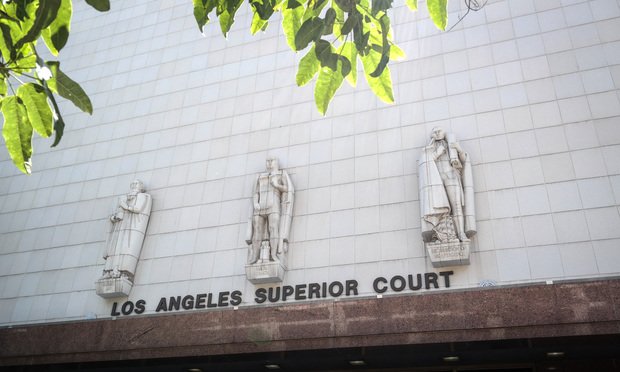Attorneys and court workers are questioning whether Los Angeles County Superior Court leaders are taking adequate pandemic safety precautions in the wake of an announcement that two employees who contracted COVID-19 have died.
In the statement, Presiding Judge Eric Taylor said a court interpreter and a traffic clerk died this month “amid the COVID-19 surge in Los Angeles County.”
The announcement did not name the employees or say when they died, but an obituary posted by the California Federation of Interpreters said Sergio Cafaro, a 56-year-old Spanish-language interpreter at the Clara Shortridge Foltz Criminal Justice Center, passed away Jan. 12 after falling ill in December. A deputy public defender died from COVID-19 in May.
“With these losses, we are reminded of the devastating nature of this pandemic and its impact on our county,” Taylor said. “And while we continue to implement extensive safety measures in all of our 38 courthouses, none of us is immune to this plague on our nation.”
“There is no indication that the recent COVID-19 surge has been exacerbated within the courts,” Taylor said in the statement.
Los Angeles has become a national hotspot for the COVID-19 pandemic with the county reporting more than 1 million infections and 13,936 deaths as of Monday. Los Angeles court leaders, like those in other counties, have grappled with how to minimize the spread of the virus while keeping essential proceedings moving in the country’s largest trial court system. While the Judicial Council has published guidance for courts dealing with the pandemic, courts have largely been left to craft their own responses.
Neither the Judicial Council nor the Los Angeles court publish a running tally of workplace infections. A Los Angeles County public health department dashboard reports that the Stanley Mosk Courthouse has had 61 infections while the Metropolitan Courthouse has had 16. It does not list cases at the court’s 36 other sites.
Chief Justice Tani Cantil-Sakauye has signed a dozen emergency orders for the court since March 2020, authorizing delays in proceedings in an effort to keep as many people as possible out of Los Angeles’ 38 courthouses. The court has also set up an appointment system for some cases, ordered mask-wearing by judges and others entering the court, and created a morning and afternoon criminal calendar system.
But attorneys and court employee representatives who spoke with The Recorder say enforcement of the safety rules vary widely from one courthouse to another and even one courtroom to the next. Communication about infections is spotty at best, they said, and remote technology isn’t used consistently.
“I’ve had in-custody clients come into the courtroom without a mask and nobody said a word,” said Beverly Hills criminal defense attorney Kate Hardie.
Hardie said she’s seen groups congregating in hallways with no adherence to the physical-distancing rules while people let their masks slip below their noses and mouths. Hardie has also been told to show up in person for certain proceedings while prosecutors were allowed to appear remotely. Forms for potential contract-tracing that attorneys are supposed to fill out in each courtroom are only available about half the time, she said, and squabbles have broken out over crowding onto elevators.
“I wish everybody would just follow the rules,” Hardie said. “I go to other counties and there are rules that people seem to abide by. They just make things better for everybody.”
Messages left with Taylor and the court’s communications office were not returned Tuesday.
Two deputy public defenders who spoke with The Recorder said no one entering the courthouse is screened, either by taking entrants’ temperatures or asking whether they feel ill. They noted the court has placed physical distancing stickers on the floors and on seats, but outside a courtroom, nobody enforces rules.
And while the court has imposed morning and afternoon “shifts” for some criminal case proceedings, arraignment and preliminary hearing matters are exempt. Lawyers said hallways on the third floor of the Foltz Criminal Justice Center still grow crowded in the mornings.
Another problem is the lockup area where defendants await courtroom proceedings. The spaces are small, said deputy public defender Garrett Miller, with multiple defendants in a cell. Lawyers and interpreters go into those spaces regularly to speak with clients.
“There was never a perfect solution but a lot of us felt that there may have been too many proceedings restarted too quickly,” said Miller.
While at least some courtrooms collect contract-tracing information, attorneys aren’t sure what happens to it. Several lawyers who spoke with The Recorder said they get more details about infections in the courthouse through word-of-mouth than from the court itself.
In the statement issued Jan. 15, court leaders say they report all positive COVID-19 cases throughout the system to court employees and judicial officers. They do not, however, make those reports available to the public.
Court Watch Los Angeles, a website and Twitter account run by several private legal and community groups, has posted what it says are some of those reports. A court communications officer did not respond to questions about the reports. The Jan. 15 statement from the court warned that “inaccurate, insensitive and exploitative information often circulates on social media.”
Lawyers detailed their own methods for trying to stay healthy while coming to court. They wear masks consistently, carry hand sanitizer and sometimes cleaning wipes. They stay home when they can but note that’s a luxury many of their clients don’t have.
“You just do the best you can,” Miller said.
NOT FOR REPRINT
© 2024 ALM Global, LLC, All Rights Reserved. Request academic re-use from www.copyright.com. All other uses, submit a request to [email protected]. For more information visit Asset & Logo Licensing.


 Los Angeles Superior Court
Los Angeles Superior Court






